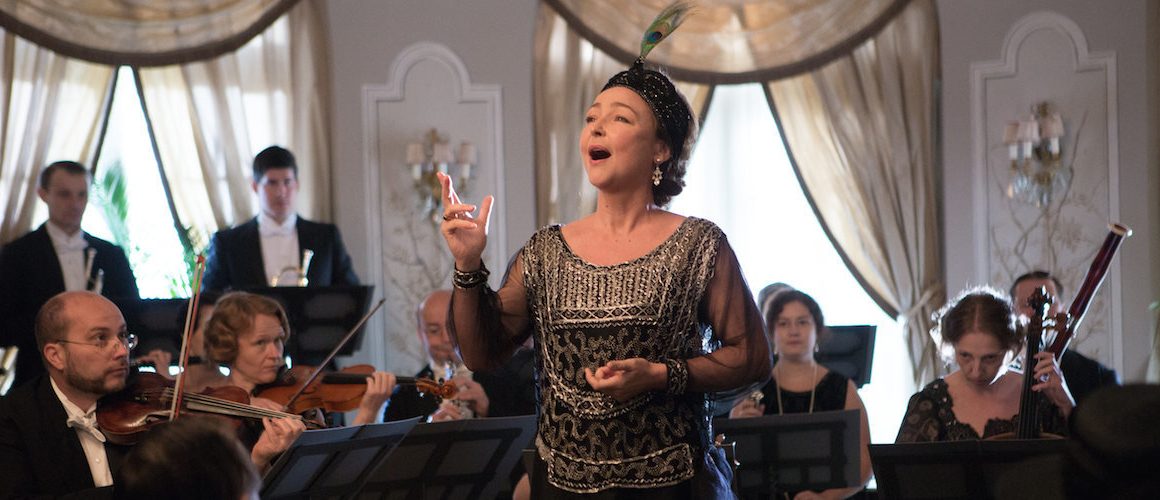PRESENTATION AT “Focus On French Cinema” 2016 On The Showing Of French Film “Marguerite” Starring Catherine Froh
I love the element of paradox in art! And opera is right up there at the top for the best examples. Richard Strauss and his librettist Hofmannsthal debated in the beautiful opera ‘Capriccio’ which presents the age old problem in vocal music…which is more important, words or music? ‘Le Nozze di Figaro’ by Mozart has all manner of characters dressed up as someone else in great masquerades of belief and disbelief. Or ‘Ariadne auf Naxos,’ an opera within an opera with characters from the sublime to the macabre mirroring alter egos. Outside of paradox in the world of music, I DO know the most important element in all of opera…the voice!
I have been a professional and working operatic soprano for forty years. I have known the beauty of my discipline and always tried to live within the inspiration of my work. This is the inspiration that breathes life into notes on the page and communicates to the audience a powerful emotional message born through the strength of musical language. Many singers have been blessed with the talent to begin with and given the right vocal cords for the job. But what about those who have the ‘aspiration’ to become a singer but don’t necessarily have the raw talent on which to build the art form? Or those who grew up adoring the opera and feel a need to live it merely by association with others who are masters of their craft?
In my singing career, I have come upon several of these individuals and many times it comes with the mantel of the wealthy. I have watched several ‘would be’ singers spend vast amounts of money and exert misguided energy into an obsessional quest to have an operatic career with limited vocal talent to work with. With many, the intention to sing is stronger than the talent that they can conjure. And let’s make no mistake, the task of singing on a professional level is a Herculean one never to be taken lightly. And the personal sacrifices that one has to make along the way can be extraordinary.
Aspiration…inspiration…two worlds with a fine line in between. It is again, paradox. And that brings us into the world of the marvelous French film ‘Marguerite.’ We are presented with the passion of a woman driven by the need of ‘aspiration’ in assuming the guise of legendary singer met with a friendly audience who help her carry self belief on wings of deception. Her supporters, finding her frailty and sincerity of spirit too delicate to destroy with the truth about the lack of her talent, whisk her along in her own operatic drama…her need to feel that she is a reigning prima donna.
With her blissful naive and childlike wonder, we all want to support her. Her ardor is angelic. And as her team of producers and critics hide the truth from her they are also forced to witness their own weaknesses played out in operatic drama. Is not the search for art as important as the art form itself? Perhaps that is why we are all here in this auditorium right now…to possess an emotional experience within the art form of cinema that we perhaps cannot construct ourselves.
The symbology of what transpires in ‘Marguerite’ is profoundly layered. Through her, we cannot forget that once we are driven to find extraordinary depth as an artist we are forced to face the darkness of our souls, which has its own price to pay. And Marguerite’s motley team of genuine admirers, critics, mentors and her husband cannot escape their own paradox of uncomfortable voyeurism while playing their own part in this story.
This is a beautifully choreographed film written and directed by Xavier Giannoli with a fantastic turn by Catherine Froh as Marguerite, gaining her the 2016 Best Actress Cesar Award. Please note that she is herself a fine singer and her performances had to be electronically manufactured to give us a poor performance that many times resembles the screeching of Marguerite’s beloved peacocks. I was extraordinarily moved by her final performance on stage. Maestro Giannoli recognizes and delivers the specter of the swan song.
‘Marguerite’ inspires all of us to look at life, art and love through, as you will see, a new lens of imagination, fantasy and hope. However, I am left remembering a saying of Samuel Taylor Coleridge which I have embroidered on a pillow in my vocal studio for all potential singers to see. It says, “Swans sing before they die…’twere no bad thing should certain persons die before they sing!”

